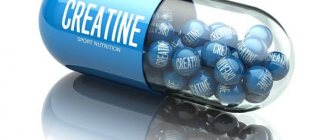What can an athlete expect from creatine?
First of all, you need to know about the real mechanism of action of this sports drug on the athlete’s body, as well as who can take it without fear. It should be clarified that the information in this article relates only to monohydrate, since this type of drug is more often used and is the most studied.
In the course of scientific research, creatine monohydrate was found to be practically harmless. Scientists have spoken about its beneficial effect on increasing human life expectancy. The small negative results that emerged were due to the fact that the subjects took additional substances at the same time as creatine, which affected the results.
In separate experiments, a group of volunteers took significantly large doses of this supplement, and even in these cases they did not experience any negative consequences, although some side effects, although rare, did occur. In order to prevent this small percentage of negativity, let's take a closer look and analyze the possible negative consequences that arise when taking creatine.
Is there any harm?
Modern science does not stand still. Every day, painstaking work is carried out to study a wide variety of complexes and drugs. Creatine, which has been the subject of dozens of studies, has not escaped attention either. It is important to remember such an important factor as operating experience. What is the result? Research and practice allow us to draw one general conclusion - creatine is safe for the body. Moreover, it does not cause harm even in case of overdose. But! Side effects of creatine do occur. Here we will talk about them in more detail.
Creatine retains fluid
Many people know that creatine retains water in the body. This is the most common side effect associated with its use. Muscle tissue becomes denser and body weight increases mainly due to the amount of fluid retained rather than muscle growth. If you consume water optimally (about 2 liters per day), there will be no health problems. In bodybuilding, the following drying model is still relevant, where with the help of diuretics and stimulants, excess water is “driven”, achieving a clear relief, but causing irreparable damage to the body. But, as researchers have proven, creatine has nothing to do with it. In natural bodybuilding there is no such problem, because... Natural people “for religious reasons” do not take diuretics.
Does creatine affect hair condition?
There are rumors that this supplement negatively affects the condition of the skin, nails and hair. Some men may not pay attention to the first and second and put up with brittle nails or dry skin. But not everyone will agree to have a billiard ball hairstyle.
Scientists have conducted some research on this issue, and it has been proven that taking creatine can increase hair loss. However, not to such an extent that you go bald completely in a month. Therefore, those who have thick hair need not worry. But those who are afraid of losing extra hair should know that creatine supplements increase hair loss.
Digestive disorder
Digestive problems occur mainly during the loading phase. When using the supplement diluted in plain water on an empty stomach, it sometimes causes diarrhea, abdominal pain, cramps and nausea. As a result of the use of creatine, its molecules seem to “stick” to the walls of the gastrointestinal tract, waiting for nutrients to leak through its walls and enter the bloodstream. Therefore, if the stomach is empty, the body cannot recognize the creatine molecules and will try to get rid of them. Therefore, the developers of the sports supplement recommend taking it with juice, protein or amino acids.
It also happens that digestive problems occur due to poor purification of creatine, so preference should be given to high-quality supplements. Although nowadays it is difficult to find such low-quality products in the field of sports nutrition. Well-known manufacturers offer creatine monohydrate, which is well absorbed by the body. Such negative manifestations in the gastrointestinal tract are no longer so common.
Composition and properties of creatine
This natural protein consists of several components. In tandem, they create a product that helps you quickly build muscle mass and increase your physical abilities.
So, creatine contains arginine, glycine and methionine. Individually, they have very useful properties. But together these three substances do incredible things. In particular, if you want to gain muscle mass. Not all preparations based on it have this composition and properties of creatine. Some manufacturers produce creatine with the addition of many vitamins and microelements.
Effect on the liver and kidneys
Numerous studies have reliably established that even large doses of creatine monohydrate do not have a bad effect on the functioning and condition of these organs in healthy people. However, a certain limit on the absorption of the drug is still present. If an athlete consumes an “excessive” amount of this supplement for a long time, then not everything will be absorbed by the muscle fibers, and the body will be forced to utilize the excess. The liver will filter it and then excrete it through the kidneys. The kidneys will experience increased stress, thus creating a potential risk of kidney stones.
Scientific studies have shown that persons with certain pathologies of these organs should avoid the use of creatine. It is “excessive” megadoses of this drug that have a negative effect on these organs.
The difference between a medicine and a poison is the dose.
Will creatine harm your health?
This is the first question that arises among people who want to “build” a beautiful body. Everyone is afraid, everyone is worried and is looking for an answer to this question. However, you need to independently research the pros and cons of taking the drug, the properties and composition of creatine.
Today there is no single scientific study on the dangers of creatine for human health. There is an opinion that it has a negative effect on the kidneys or liver function. However, the professors proved the opposite. Therefore, taking medications based on this substance can in no way harm your health. Except in cases where the recommended dose is exceeded. It is for this reason that the instructions always indicate how much creatine a particular person needs to take.
Pressure, muscle spasms, cramps, acne
As mentioned above, creatine retains water in the body. Its intake and dosage must be calculated correctly, otherwise blood pressure may increase. After all, after the monohydrate is absorbed into the bloodstream, it passes through the bloodstream, simultaneously attracting water molecules to itself. The volume of blood pumped increases, and this leads to an increase in pressure. In reality, there are sharp pressure surges: it first drops, then rises. As a result, the athlete must drink a sufficient amount of clean water to normalize the water-salt balance.
In practice, muscle spasms occur extremely rarely. Many researchers do not see a connection at all between their appearance, as well as cramps with creatine intake, since tests on athletes do not reveal a clear causal relationship. To prevent this, you should drink enough fluid.
Some athletes in reviews indicate that after using the supplement, their facial skin becomes covered with acne. However, acne, like a pustular skin lesion, is rarely detected after using creatine. This, one might say, is an exception to the rule, which is most likely due to the simultaneous use of testosterone drugs by these athletes.
Whether to use creatine or not is a personal matter for each athlete, who has sensibly weighed all the pros and small cons of the drug. If an athlete takes creatine correctly, this will only have a positive effect on his health. However, overusing it can significantly worsen it. According to scientific research, negative effects from this drug occur in only 4% of cases, and of these, only 0.01% are irreversible.
We can confidently say that now creatine monohydrate is an almost harmless sports supplement. Adverse consequences can only occur with an inadequate overdose; in all other cases, there are only positive effects from it.
Questions about the product Creatine (MusclePharm) 300 g
| Gregory 4.07.2017 12:13 | How long does the course of taking this creatine last? <Ilya Melekhin, sports medicine doctor> 4.07.2017 12:21 Monthly course |
| Is the question useful? Yes 0 / No 0 | |
| Gregory 6.06.2017 20:58 | How many times a day should I take creatine and at what time? immediately after waking up, before training or after? <Ilya Melekhin, sports medicine doctor> 6.06.2017 20:59 Take creatine after training and on rest days in the morning. <Gregory> 6.06.2017 21:02 1 serving (5 g) per day? <Ilya Melekhin, sports medicine doctor> 6.06.2017 22:09 Yes, serving 5 g |
| Is the question useful? Yes 0 / No 0 | |
| Yaroslav 18.04.2016 14:22 | I wanted to ask if creatine will help in preparing for a marathon? or rather the other way around... <Ilya Melekhin, sports medicine doctor> 18.04.2016 15:13 I think you don’t need creatine, but BCAA, for example, is really necessary. |
| Is the question useful? Yes 0 / No 0 | |
| Kirill Vladimirovich 17.02.2016 10:16 | Hello, is this supplement allowed during competition? Competition: powerlifting with additional control <Ilya Melekhin, sports medicine doctor> 17.02.2016 10:20 Creatine is allowed without restrictions at any time |
| Is the question useful? Yes 0 / No 0 | |
| Me again 6.02.2016 00:25 | Please tell me, is it possible to use creatine for weight loss? <Ilya Melekhin, sports medicine doctor> 6.02.2016 08:50 You can use creatine when losing weight, but you must exercise and eat properly, otherwise you won’t get anything other than gaining water. |
| Is the question useful? Yes 0 / No 0 | |
| Sergey 24.09.2015 16:54 | Tell me the regimen for taking VSAA and creatine <Ilya Melekhin, sports medicine doctor> 24.09.2015 17:00 BCAA one serving 15 minutes before the second immediately after training, creatine 5 g after training |
| Is the question useful? Yes 0 / No 0 | |
| Alexei 2.09.2015 12:03 | Does this creatine retain water a lot? <Ilya Melekhin, sports medicine doctor> 2.09.2015 12:12 Any creatine can retain water, but this is not a necessary property of it. |
| Is the question useful? Yes 0 / No 0 | |
| Nikolai 16.08.2015 13:07 | Good afternoon. This product contains 5 different types of creatine and that’s it, where is the transport system? It turns out that when you take it, you also need to add 3-4 tablespoons of sugar per serving, or am I wrong? <Ilya Melekhin, sports medicine doctor> 16.08.2015 13:25 The manufacturer writes: MusclePharm Creatine also contains cinnuline, a substance recommended for improving the absorption of creatine. Cinnulin allows you to increase the effectiveness of creatine, ensuring its direct entry into muscle cells. From myself - why 3-4 tablespoons of sugar? Drink with juice or protein - both are good transport. <Nikolai> 16.08.2015 14:45 Thanks for the answer! |
| Is the question useful? Yes 0 / No 0 | |
| Alexei 6.08.2015 11:25 | Is it still recommended only on the day of training or 5g daily? Regardless of the type of creatine, the body still stores it, right? <Ilya Melekhin, sports medicine doctor> 6.08.2015 11:32 If training is regular, then on training days 5 grams after it, on rest days 5 grams in the morning <Alexey> 6.08.2015 14:21 I usually take it between breakfast and lunch, on a more or less empty stomach, 5g daily, training 2-4 times a week. However, does the body store creatine regardless of the derivative form of this product? <Ilya Melekhin, sports medicine doctor> 6.08.2015 15:11 It’s better to take it after training, it will be more effective <Alexey> 6.08.2015 16:42 Is the opinion that it is better to take it on an empty stomach correct? Or will taking it together with protein spoil the results? <Ilya Melekhin, sports medicine doctor> 6.08.2015 16:51 You can take it with protein, but it’s better to tie your creatine intake to your workout and drink it after it. |
| Is the question useful? Yes 0 / No 0 | |
| .Dmitriy 16.08.2014 22:52 | Creatine is just creatine. Nothing special. You need to retain water, get bigger, please. Strength is doubtful; it is not a panacea or a steroid. In short, in fact, you will gain 3-5 kilograms of water, stop using it, and everything will come back. You better grind the beef, it will be healthier. And yes, you can mix it with protein if you really want to. <Kefir> 14.12.2014 00:29 here is Dmitry, who couldn’t hold back the mass, and scientific experiments have proven that the rollback effect is only 40% of what was gained, it’s all in the mode, some of them waste 80% of what they got in farming =-) |
| Is the question useful? Yes 1 / No 3 | |
| Mikha 7.07.2014 02:51 | how to understand the loading phase? This is like 5 grams in the morning. 5 grams during the day and 5 grams in the evening... and how to ride with it? drink for a month and then not drink for a month? Yes ? <Evgeniy Kovtunenko, expert 5lb> 7.07.2014 11:39 Um. Mikha, the “loading phase” of creatine means that you need to drink more than 5 grams of it. Something like this: 10g three times a day for three days. Then reduce it to 5g three times a day and drink this for a month. |
| Is the question useful? Yes 0 / No 1 | |
| novel 22.04.2014 22:14 | since it is correct to drink it, the recommendations say that it is an hour before training |
| Is the question useful? Yes 0 / No 1 | |
| Max 7.04.2014 06:18 | It does not contain Con-Cret hydrochloride. There is Creatine MagnaPower (Creatine magnesium chelate), i.e. a mixture of creatine and magnesium. |
| Is the question useful? Yes 0 / No 0 |
Conclusions about the benefits of creatine
Taking into account the above, including the characteristics of creatine, we can draw the following conclusions about the benefits of this dietary supplement:
- Creatine increases physical endurance of muscles and promotes rapid muscle growth. Regular use of this dietary supplement creates additional energy reserves at the cellular and tissue level in the human body.
- Creatine promotes water retention in the body. During a period when muscle mass is rapidly growing, this is a very important indicator.
- Creatine has a neutralizing effect on certain acids produced during intense training. One of them is lactic acid. This allows you to train for a longer time and at a higher quality.
- Regular intake of creatine trains the body to withstand physical activity much longer without the required amount of oxygen and with high muscle tension. One of the important conditions for taking creatine is to use it at a time when muscle mass is “burning” and is in its most active state.
- Creatine also has a positive effect on heart function. In particular, the heart muscle. He is able to increase the power of her work. However, this property of this substance is more applicable in medicine than in sports.
Creatine is not a hormone, as many people believe, which is why they are afraid to take it. Most athletes are afraid of any changes in hormonal levels. Doctors say these fears are unfounded. Taking creatine is generally safe for health.
However, you should not abuse this substance, like many others, to avoid unwanted side effects.
Take care of yourself! Take care of your physical and mental health! Carefully monitor your diet and exercise regularly. Then your achievements in your sports life will be obvious, and your appearance will definitely please you.
How does Creatine Monohydrate work?
To understand the effects of Creatine, you need to know what ATP is and how it works. ATP is a readily available source of energy necessary for muscle contraction. The muscles themselves contain enough ATP for several contractions. The rest of the energy must come from the ATP stores found in the body.
The action of Creatine Monohydrate is to convert it in the human body into Creatine Phosphate, with the help of which ATP is produced, which in turn can be used during training. Due to this, you can lift more weights and do more repetitions. This extra energy is often called "explosive".










